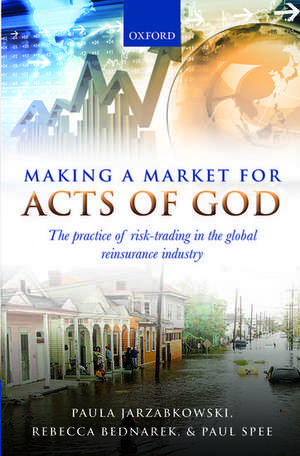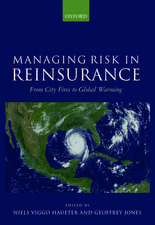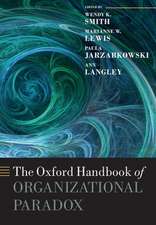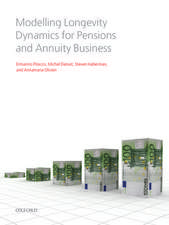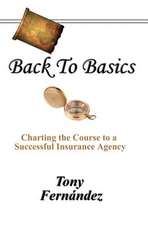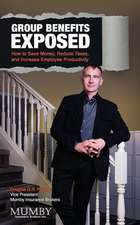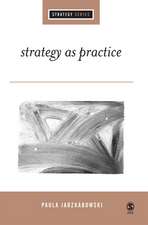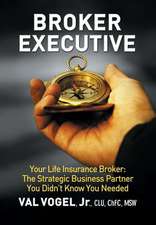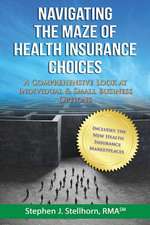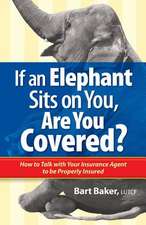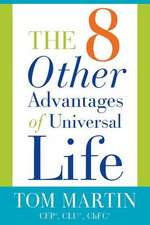Making a Market for Acts of God: The Practice of Risk Trading in the Global Reinsurance Industry
Autor Paula Jarzabkowski, Rebecca Bednarek, Paul Speeen Limba Engleză Hardback – 19 mar 2015
| Toate formatele și edițiile | Preț | Express |
|---|---|---|
| Paperback (1) | 190.67 lei 31-37 zile | |
| OUP OXFORD – 30 mar 2017 | 190.67 lei 31-37 zile | |
| Hardback (1) | 347.51 lei 31-37 zile | |
| OUP OXFORD – 19 mar 2015 | 347.51 lei 31-37 zile |
Preț: 347.51 lei
Preț vechi: 402.87 lei
-14% Nou
Puncte Express: 521
Preț estimativ în valută:
66.50€ • 69.18$ • 54.90£
66.50€ • 69.18$ • 54.90£
Carte tipărită la comandă
Livrare economică 03-09 aprilie
Preluare comenzi: 021 569.72.76
Specificații
ISBN-13: 9780199664764
ISBN-10: 0199664765
Pagini: 254
Dimensiuni: 162 x 235 x 21 mm
Greutate: 0.54 kg
Editura: OUP OXFORD
Colecția OUP Oxford
Locul publicării:Oxford, United Kingdom
ISBN-10: 0199664765
Pagini: 254
Dimensiuni: 162 x 235 x 21 mm
Greutate: 0.54 kg
Editura: OUP OXFORD
Colecția OUP Oxford
Locul publicării:Oxford, United Kingdom
Recenzii
The authors should be commended first for taking on such a substantive project and second for presenting it in so comprehensive and comprehensible a theoretical story.
The biggest asset of this book is its comprehensive ethnography. Anyone interested in the sociology of insurance and financial markets will profit from having read this striking empirical account of the reinsurance industry.
Jarzabkowski, Bednarek, and Spees fascinating book on the reinsurance industry. From 2009 to 2012, the authors conducted a global ethnographic study of the reinsurance market, observing practitioners, particularly underwriters, as they went about their business. Their work is a contribution to the burgeoning field of social studies of financial markets. The theoretical focus here is on relations and practices rather than individuals and organizationson how a global market is made through the common practices and understandings that underwriters enact. In parallel to theoretical arguments, we are treated to a number of captivating vignettes from the authors observations of underwriters at work, taking us from London to Singapore, from Florida to Bermuda.
Jarzabkowskis work is striking for at least two reasons. First, the question of how society protects itself from the cost of natural disasters is becoming very important, given the climate change challenges that the United Nations has been debating this week. Second, this project touches on a point that matters beyond the insurance world: namely, that we all have an amazing tendency to fool ourselves. For what Jarzabkowskis team discovered when they put insurance brokers under the microscope was that they use words such as markets, risk, diversification and globalisation in very contradictory ways.
This detailed study covers the reinsurance underwriters who manage the risk of natural disasters that result in extreme claims ... The authors begin the book with an overview of the reinsurance market. The chapters that follow cover managing collective risk, transforming disasters into deals, managing the absence of models, supporting competition in a consensus market, moving from a market for acts of God to one for commodities, and proposing a practice theory of the market.
Darwin travelled to the Galapagos to see how species evolved. Paula travelled to more congenial places - Bermuda, Lloyds of London, European capitals, Asian capitals and Monte Carlo to see the reinsurance tribes at work. The result is a groundbreaking book explaining what the different tribes actually do. It is an insightful and vivid account that explains how our market works, how it identifies, prices and manages risk. It also provides important warnings regarding the implications of recent changes to industry structure. It is a must read for anyone interested in (re)insurance, including those working in this industry.
This path-breaking book provides the first extended study of the world of reinsurance underwriters and their risk-trading expertise and practice. Based on careful ethnographic analysis at a number of global sites, the authors provide insights into the unique networks and practices which constitute the global reinsurance market and its role as the ultimate societal safety net against large scale acts of God. This is a book about reinsurance but Jarzabkowski, Bednarek and Spee have achieved much more than this, making it a must read for anyone working on practice theory, risk studies, economic sociology and social studies of finance.
We thought that the risk society would cause humanity to ponder the sustainability of the conditions of its existence. The book shows, however, that the risk society is also, above all, a formidable opportunity for financial markets. By analysing how reinsurers turn natural disasters unpredictable and theoretically incalculable Acts of God into tradable objects, the authors provide a major contribution to understanding the marketization of our societies and its implications.
Making a Market for Acts of God provides a fascinating and incisive practice-based account of how reinsurance markets function for large-scale disasters, where assessment of risk can be more of an art than a science. Reporting on an ambitious project that details how a globally distributed market gets coordinated, it is a must read for those interested in practice theory, social studies of markets, and the social construction of risk.
This ethnographic study of the insurance industry performs an important and urgent task: it exposes the everyday practices by which global financial markets work. The authors bring wonderful clarity to difficult themes, from the structuring of financial deals to developing a macro-level theory of social practice that will be insightful for scholars adopting strategy-as-practice or practice approaches more broadly. This book will be a stimulating read for financial professionals, social scientists, regulators and policy makers alike.
This astonishingly thorough global ethnography, involving fieldwork in seventeen countries and over four hundred interviews, paints a fascinating picture of the practices of a unique, and hugely important industry.
Jarzabkowski, Bednarek and Spee succeed in the ambitious project of describing the global reinsurance market in terms of a set of interrelated practices. The book provides an original contribution to the social studies of markets and finance and is without a doubt one of the best available illustrations of the heuristic power of the practice approach. It is also a demonstration of how relational and practice-based approaches can tackle big questions and provide fresh and relevant insights. Above all, the book is testimony of the excellent intellectual skills and methodological prowess of the authors - a masterclass in how to study and describe in an accessible way a seemingly complex and almost intractable phenomenon. A notable achievement.
Despite ever worse natural and man-made disasters, somehow the money is found to cover gigantic losses and rebuild. Who insures the insurers and how do they do it? In this important contribution to the new sociology of financial markets Paula Jarzabkowski, Rebecca Bednarek and Paul Spee make the case for studying reinsurance as a neglected part of the global financial market. They track the agents through their yearly cycle of desk work, deal making, and global conference hopping. The losses are potentially so huge that no one company can cover then all so this leads to collaborative deal-making and information sharing.
For hundreds of years we have traded variable cost - being risk - for fixed cost - being premium in our insurance world. Risk transfer, eventually leading to diversification of risk, is a mechanism that works as well today as ever. Today, we also start to think about risk differently with risk becoming an viable alternative asset class in a world of low interest rates. This book makes a significant contribution to a debate about an industry that is the oil in the engine of economic activity. It is a great piece of work.
This is a superb book that offers us a rich and rigorous understanding of a little known but important industry, showing us how the worlds greatest risks are bought and sold, and in the process, how they are collectively and relationally managed so that the rest of us can sleep at night. The book is based on a superbly detailed global ethnography that takes us to London, Bermuda, Paris and Hong Kong, plunging the reader into the everyday lives, practices and social worlds of the real people who work out the deals making up this extraordinary market. A great read that makes a significant contribution to management scholarship.
Making a Market for Acts of God is in the tradition of studies that ask how markets actually work. It is the richest ethnography yet on the process and practice of market making. Beyond that, it draws together earlier theories of market making to weave a thick description of the social nature of the markets.
In a very lively style, Paula, Rebecca and Paul zoom on every facet of our industry, analyzing codes, culture, norms and the complexity of each of them. They underline the value of the contextual and shared knowledge in the market which is an important contribution to the decision process when underwriting risks. The great value of this book is its complementary to the numerous technical and financial studies produced so far in our industry and its ethnographic approach of the market. Any one managing a company, a business, capital provider, underwriters, analysts should read this book. Everyone will recognize himself and its contribution to the value chain produced to mitigate these ACTS of GODS.
From London to Hong Kong and Monaco to Australia, the authors cast an ethnographers eye on the practice of reinsurance, extending the strategy as practice paradigm into the terrain of insurance and finance. In doing so, Making a Market for Acts of God provides a unique material portrait of how markets and organizations deal with risk at a global scale, offering a new and important contribution to the social studies of finance.
The biggest asset of this book is its comprehensive ethnography. Anyone interested in the sociology of insurance and financial markets will profit from having read this striking empirical account of the reinsurance industry.
Jarzabkowski, Bednarek, and Spees fascinating book on the reinsurance industry. From 2009 to 2012, the authors conducted a global ethnographic study of the reinsurance market, observing practitioners, particularly underwriters, as they went about their business. Their work is a contribution to the burgeoning field of social studies of financial markets. The theoretical focus here is on relations and practices rather than individuals and organizationson how a global market is made through the common practices and understandings that underwriters enact. In parallel to theoretical arguments, we are treated to a number of captivating vignettes from the authors observations of underwriters at work, taking us from London to Singapore, from Florida to Bermuda.
Jarzabkowskis work is striking for at least two reasons. First, the question of how society protects itself from the cost of natural disasters is becoming very important, given the climate change challenges that the United Nations has been debating this week. Second, this project touches on a point that matters beyond the insurance world: namely, that we all have an amazing tendency to fool ourselves. For what Jarzabkowskis team discovered when they put insurance brokers under the microscope was that they use words such as markets, risk, diversification and globalisation in very contradictory ways.
This detailed study covers the reinsurance underwriters who manage the risk of natural disasters that result in extreme claims ... The authors begin the book with an overview of the reinsurance market. The chapters that follow cover managing collective risk, transforming disasters into deals, managing the absence of models, supporting competition in a consensus market, moving from a market for acts of God to one for commodities, and proposing a practice theory of the market.
Darwin travelled to the Galapagos to see how species evolved. Paula travelled to more congenial places - Bermuda, Lloyds of London, European capitals, Asian capitals and Monte Carlo to see the reinsurance tribes at work. The result is a groundbreaking book explaining what the different tribes actually do. It is an insightful and vivid account that explains how our market works, how it identifies, prices and manages risk. It also provides important warnings regarding the implications of recent changes to industry structure. It is a must read for anyone interested in (re)insurance, including those working in this industry.
This path-breaking book provides the first extended study of the world of reinsurance underwriters and their risk-trading expertise and practice. Based on careful ethnographic analysis at a number of global sites, the authors provide insights into the unique networks and practices which constitute the global reinsurance market and its role as the ultimate societal safety net against large scale acts of God. This is a book about reinsurance but Jarzabkowski, Bednarek and Spee have achieved much more than this, making it a must read for anyone working on practice theory, risk studies, economic sociology and social studies of finance.
We thought that the risk society would cause humanity to ponder the sustainability of the conditions of its existence. The book shows, however, that the risk society is also, above all, a formidable opportunity for financial markets. By analysing how reinsurers turn natural disasters unpredictable and theoretically incalculable Acts of God into tradable objects, the authors provide a major contribution to understanding the marketization of our societies and its implications.
Making a Market for Acts of God provides a fascinating and incisive practice-based account of how reinsurance markets function for large-scale disasters, where assessment of risk can be more of an art than a science. Reporting on an ambitious project that details how a globally distributed market gets coordinated, it is a must read for those interested in practice theory, social studies of markets, and the social construction of risk.
This ethnographic study of the insurance industry performs an important and urgent task: it exposes the everyday practices by which global financial markets work. The authors bring wonderful clarity to difficult themes, from the structuring of financial deals to developing a macro-level theory of social practice that will be insightful for scholars adopting strategy-as-practice or practice approaches more broadly. This book will be a stimulating read for financial professionals, social scientists, regulators and policy makers alike.
This astonishingly thorough global ethnography, involving fieldwork in seventeen countries and over four hundred interviews, paints a fascinating picture of the practices of a unique, and hugely important industry.
Jarzabkowski, Bednarek and Spee succeed in the ambitious project of describing the global reinsurance market in terms of a set of interrelated practices. The book provides an original contribution to the social studies of markets and finance and is without a doubt one of the best available illustrations of the heuristic power of the practice approach. It is also a demonstration of how relational and practice-based approaches can tackle big questions and provide fresh and relevant insights. Above all, the book is testimony of the excellent intellectual skills and methodological prowess of the authors - a masterclass in how to study and describe in an accessible way a seemingly complex and almost intractable phenomenon. A notable achievement.
Despite ever worse natural and man-made disasters, somehow the money is found to cover gigantic losses and rebuild. Who insures the insurers and how do they do it? In this important contribution to the new sociology of financial markets Paula Jarzabkowski, Rebecca Bednarek and Paul Spee make the case for studying reinsurance as a neglected part of the global financial market. They track the agents through their yearly cycle of desk work, deal making, and global conference hopping. The losses are potentially so huge that no one company can cover then all so this leads to collaborative deal-making and information sharing.
For hundreds of years we have traded variable cost - being risk - for fixed cost - being premium in our insurance world. Risk transfer, eventually leading to diversification of risk, is a mechanism that works as well today as ever. Today, we also start to think about risk differently with risk becoming an viable alternative asset class in a world of low interest rates. This book makes a significant contribution to a debate about an industry that is the oil in the engine of economic activity. It is a great piece of work.
This is a superb book that offers us a rich and rigorous understanding of a little known but important industry, showing us how the worlds greatest risks are bought and sold, and in the process, how they are collectively and relationally managed so that the rest of us can sleep at night. The book is based on a superbly detailed global ethnography that takes us to London, Bermuda, Paris and Hong Kong, plunging the reader into the everyday lives, practices and social worlds of the real people who work out the deals making up this extraordinary market. A great read that makes a significant contribution to management scholarship.
Making a Market for Acts of God is in the tradition of studies that ask how markets actually work. It is the richest ethnography yet on the process and practice of market making. Beyond that, it draws together earlier theories of market making to weave a thick description of the social nature of the markets.
In a very lively style, Paula, Rebecca and Paul zoom on every facet of our industry, analyzing codes, culture, norms and the complexity of each of them. They underline the value of the contextual and shared knowledge in the market which is an important contribution to the decision process when underwriting risks. The great value of this book is its complementary to the numerous technical and financial studies produced so far in our industry and its ethnographic approach of the market. Any one managing a company, a business, capital provider, underwriters, analysts should read this book. Everyone will recognize himself and its contribution to the value chain produced to mitigate these ACTS of GODS.
From London to Hong Kong and Monaco to Australia, the authors cast an ethnographers eye on the practice of reinsurance, extending the strategy as practice paradigm into the terrain of insurance and finance. In doing so, Making a Market for Acts of God provides a unique material portrait of how markets and organizations deal with risk at a global scale, offering a new and important contribution to the social studies of finance.
Notă biografică
Professor Paula Jarzabkowski is a Professor of Strategic Management at Cass Business School, City University London. Paula's research focuses on strategy-as-practice in complex contexts and market making in financial industries, particularly insurance and reinsurance. Her research has been foundational in the establishment of the field of strategy-as-practice and she published the first book on strategy-as-practice; 'Strategy as Practice: An Activity-Based Approach'. She is experienced in qualitative methods, most recently leading and conducting the first global ethnography of the reinsurance industry. The relevance of this ethnographic study to industry was recognized in 2013 when she was awarded the prestigious ESRC Outstanding Impact on Business Award. Her work has appeared in a number of leading management and organizational journals including Academy of Management Journal, Organization Science, and Strategic Management Journal.Dr. Rebecca Bednarek is a Research Fellow at Cass Business School, City University London. Drawing from a practice-theory perspective, she has an interest in strategizing in pluralistic or paradoxical organizational settings as well as investigating the various practices, such as calculation and evaluation, through which financial markets are constructed. She has developed a strong background in qualitative research methods, including global ethnography, through her studies of the science and reinsurance sectors. Her research has been published in Human Relations, Industrial Relations Journal and Research in the Sociology of Organization. Dr. Paul Spee is a Senior Lecturer at the University Queensland Business School. Informed by social practice theory, his research interest revolves around the social dynamics of strategists and the way heuristics such as strategy tools are adopted and how they influence a firm's strategizing behavior. More recently, his work has expanded to investigate the practice of market making in the reinsurance industry, with a particular emphasis on the sociomateriality and calculative practices involved. His work has been published in leading journals on management and organization theory such as the Academy of Management Journal, International Journal of Management Reviews, Organization Studies and Strategic Organization.
